- Home
- Muriel Spark
Reality and Dreams Page 3
Reality and Dreams Read online
Page 3
CHAPTER FIVE
Tom’s room overlooked a garden of twisting gravel pathways, grass, shrubbery and trees. There were no flower-beds. His furniture and part of the floor were covered with books and papers. It was a large room, meant for himself and Claire who, since Tom’s accident, had made way for a night nurse who was lodged in an adjacent dressing room. Now Claire was back in the dressing room, the night nurse being unnecessary. However, Tom had the huge bedroom to himself for his exercises and massages by the day nurse Julia. In part of the great room was a space where a sofa, some comfortable chairs and a table of drinks and some smaller tables were disposed, and here Tom received his visitors who stepped over the books to greet him, shake his hand, or hug him as the case might be. As his injuries improved, the more frequently did he hold court. ‘My bedroom,’ he boasted to Claire, ‘is the in-place to be.’
Marigold’s brother-in-law Ralph and his wife Ruth were among his visitors one time when Tom was alone. They were on their way home having cut short their stay with Marigold to one night. Tom had not seen them for at least two years, since Marigold’s wedding. He had taken Marigold up the aisle on his arm and was aware of James’s tribe in their pews. Later, at the feast, he had met them all, and perceived that they were a clever lot. He liked Marigold’s husband, a journalist at that time, and only hoped he could make Marigold relax. Now he was a travel-writer, not that he ever took Marigold with him on his travels. It looked bad. But James’s brother Ralph was one of the family he had thought amiable and felt easy with. Claire had taken to the wife, Ruth, a shapely girl.
Claire ushered them in to Tom, who raised his elbow-crutch in greeting and turned off the television. It was exactly six o’clock in the evening. ‘Have a drink,’ said Tom. ‘Claire, give them a drink.’
Claire’s charm oozed out towards them. She was always extremely well groomed with a shiny blonde head, clear eyebrows and an oval made-up face. Her neat coat and skirt were dark, her silk shirt white. She prepared the drinks with a flash of long silver fingernails.
‘You have troubles,’ said Tom to Ralph. ‘I hear you’ve lost your job.’
‘You have worse troubles,’ said Ralph. ‘Tell us how you are.
‘Some days better than others. I take pills. The physiotherapist comes. I do exercises. Sooner or later I’ll be back to normal. At my age it might be later rather than sooner.’
‘It must have been a frightful shock,’ said Ruth.
‘He’s lucky to be alive,’ Claire said.
‘Being alive is not always lucky. But in my case it is because I enjoy my life. Can you two stay a few nights?’
‘Of course they can,’ said Claire. ‘We’ve already arranged it.’
‘Because,’ said Tom, ‘I have to go to bed early. I have supper in bed. Julia, my nurse, has to be home by seven-thirty. She has three children and a nice husband to go to. But I’d like to have a chance to talk to you tomorrow in the day time.’
‘We could all look in and see you later tonight,’ Claire said.
‘No, I’ll drop off to sleep after the news.’
‘Oh Tom,’ said Claire, ‘you must try to get out of that habit of going to sleep so early. It’ll make you old. Look at the politicians of sixty-three at the height of their careers.’
‘They make me want to sleep all the more, especially during their interviews. No eloquence, no gifts at all. And the show generally so shabbily produced. Evil lighting. Spiteful close-ups. All that. How I long for some literate entertainment. I used to know lots of older writers, thinkers and theatre people. They are all dead or nearly, now. The century is getting old, very old. Old with all the faults of old age; especially what Eliot called “the desperate exercise of failing power”. You see it everywhere. It’s grotesque.’
‘Have you any idea,’ Tom asked Julia when she brought him his supper on a tray, ‘who is dining down there to-night?’
‘The two new guests,’ said Julia. ‘And Claire and Charlie.’
‘Describe Charlie. Is he small and fat?’
‘No, tall and manly. Very good-looking, in fact. Don’t work yourself up, Tom. I’m sure he’s only a friend.’
‘Will he stay here for the night?’
‘I don’t think so.’ In the kitchen Claire the cook and Dollie, the maid, were debating that very point. No extra bed made up in the single room, nothing arranged for his breakfast. ‘We feel he’s only here for dinner, to make an extra man.’
‘How good of you to get me all this information,’ said Tom. ‘Did he bring flowers?’
‘No, no flowers. Perhaps he’ll send them tomorrow. They often send flowers after a party.’
‘Does he seem to have that much savvy?’
‘I don’t know. I haven’t had the opportunity to judge him close-up,’ said Julia who was putting on her outdoor things. ‘Will I wait for the tray?’ she said.
‘No, Claire will come up and take it away later on. Good-night, Julia.’
‘See you in the morning.’
In the morning Tom’s first visitor was Ralph. It was nine-thirty. The bed was made and Tom was sitting in his chair with his legs up on an orthopaedic rest.
‘Apart from this disability,’ said Tom, ‘we are putting a lift in the house, so that we can get up and down. As it is, I expect to do the stairs within a month, six weeks. That’s what they say.’
‘If there’s anything I can do…’
‘Nothing, thanks. I suppose you are busy looking for another job.’
‘I’m going to be active in that area. I believe it’s more exhausting looking for work than doing it.’
‘Did your redundancy come as a shock?’
‘Yes. Although I might have expected it. I was truly under shock. From one moment to the next I had status, a settled income, then nothing. But I pulled myself together enough to make a deal with the firm. That included the severance handshake and the hush-money.’
‘What hush-money?’
‘Not to reveal the secrets of the firm to the next employer.’
‘That should be a difficult promise to keep. You would be bound to use your utmost knowledge in a new job.’
‘Yes, it’s an impossible promise to keep. It’s only that once having signed an agreement one doesn’t actually go round selling knowledge as a separate item. Especially in the electronics business, knowledge is valuable.’
‘Knowledge is always valuable,’ said Tom. He was looking at Ralph with new eyes: check shirt, smart, loose country jacket, slim twill trousers, good shoes. An open face with a flush of pink, wide grey eyes, plenty of sleek dark hair, hands in good shape. Ralph had been envied for his earning power by his brother, Tom’s son-in-law, who wrote travel books but lived above his income, largely, now, on Marigold’s money which, through Claire, was considerable. Ralph was no longer a financial prodigy. He was out of work, probably for a long time, possibly for ever.
‘You have youth on your side,’ Tom said.
‘You mean I can switch my brain to something else?’ Ralph said.
‘Yes, that’s one of the things I mean.’
‘I can tell you from personal experience,’ Ralph said, ‘that redundancy causes sexual disaster. It causes anxiety and inadequate erections.’
‘These are early days,’ said Tom. ‘You’ll get over that hang-up in a few weeks.’
‘According to statistics, no. Apparently the phenomenon of male redundancy is frequently accompanied by a brusque fall in sexual activity and reduced desire with the impossibility of having a complete erection. I read an article about it, and now I’ve found it’s so.’
‘It will pass. It’s only the result of shock. Don’t try.’
‘That’s what Ruth says. She’s very understanding about it.’
‘Lucky fellow.’
Julia came in with her many-toothed smile, fresh in her mauve and white uniform. She had a small medicine glass containing a number of antibiotic pills in one hand and a glass of water in another. Tom swallowed the pills an
d washed them down. ‘Beastly stuff,’ he said.
Julia bent her smile on Ralph as she went out.
‘Good-looking,’ said Ralph.
‘Toothy.’
‘Toothy women are said to be sexy.’
‘I wouldn’t know. She has a husband and three children. At the moment I’m not sexually active, but I have the most intense desires. Normally, I have a great many women.’
‘So I’ve heard. Hadn’t I better go?’
‘No, don’t go. Mornings are the most boring times for me. In the afternoons I read and in the evenings I watch something on the television, idiot-box though it is, or a video, sometimes with Claire. Unless you’re in a hurry —’
‘No hurry at all. I came really to tell you that Claire has been awfully good to us. Last night she gave Ruth a cheque for five thousand pounds. We are not at the moment in need but it is acceptable and wonderful of Claire, considering we are not very closely related.’
‘Claire is very rich,’ Tom said. ‘Claire is also very generous with her money. I’m glad to say.’
‘I wanted to make sure you approve.
‘Oh, I approve of everything Claire does. I spend my life approving of Claire. We have been married over a quarter of a century.’
‘You seem to have spent your life being a success.’
‘It’s not enough,’ said Tom. ‘Now I’m redundant.’
‘Not permanently. To be in your position must be a great satisfaction,’ said Ralph. He got up and went to the window, apparently to look at the garden below. It was a fine day, a fact which did not seem to be of much comfort to Ralph, Tom thought; quite the reverse, perhaps.
‘When I was a young writer, when I first wrote and directed,’ Tom said, ‘I had a great many friends older than myself, some a little older, some much older. Now that I need them to come and visit me, to pass by and talk to me, most of them are dead. If Auden were alive he would have come to see me in his shabby clothes. Wystan said he always felt his parents should provide his clothes and couldn’t shake off that feeling even now when he was an adult. He liked to spend his money on food. Wystan gave good dinners. I remember in the sixties when he lived in Manhattan in a near-slum in St. Mark’s Place what fine food he would sit one down to. At least, his man friend Chester Kallman used to cook that delicious food. Wystan kept his new work under the sofa. He would scramble under the sofa to bring out his batch of poems to read to me. Chester would come out of the kitchen into the room with a red face, wearing his cooking apron. In fact I seldom saw Chester without his apron. Even in Austria the last time I went to see them, Chester was wearing that big kitchen apron. He made Austrian food — dumplings, but so special. He was more than a cook, however, he was a good librettist.
‘If Graham Greene were alive he would have looked in to see me, perhaps not in hospital but certainly here at home. Sex was his main subject, when you met him at least to start with. He had a mix-up of women and felt guilty the whole time. Without girls I think he couldn’t have carried on. He needed it for his writing. Graham would have sent me a dozen bottles of rare wine or champagne. He would have come for an evening’s talk and drink if he had known I was stuck in this bedroom. He would talk about sex always as if it was the forbidden fruit of the tree of knowledge. Sex and desire and the hazards thereof, such as divorce and venereal disease. I tried to get him on to religion but he was chary of that subject, Catholicism. He believed in it without swallowing everything, which is possible, and in fact more widely practised than one might think. In fact he couldn’t not believe, in spite of himself.
‘So much for his beliefs, but in some ways he had a bureaucratic conception of Catholic doctrine, but so do many Catholics including the present Pope. Greene never called me Tom, by the way. It was always “Richards”. But he called Claire “Claire” of course. Which reminds me of Allen Tate another Catholic who was keen on women. Have you heard of Tate?’
‘No,’ said Ralph. ‘Unless you mean an American writer, I seem to remember…’
‘You remember right. He was an American poet, critic, and Anglophile. He went to see Pius XII in 1957. He told me how it went. Allen said, “Your Holiness, the English and American Catholic Bishops are feeling uneasy about the Index of Forbidden Books. After the acts of censorship under totalitarianism the intelligent Catholic laity want more democratic freedom.”
“‘Ah yes,” said Pius, “Maritain was here last week with that problem. Greene came about it recently. How many children, — nephews, do you have?”
‘Allen told him how many.
‘The Pope said, “Here are four rosaries. The black ones are for boys, the white for girls.” End of audience.’
‘Was that the Pope before this?’
‘No it was actually five Popes ago.’
‘Don’t your friends ring you up?’
‘Yes, they do. Claire takes the calls. I don’t always want to talk. People can send me a fax. They do, quite often. I don’t always want to reply. They want to know if I’ll be ready to give a lecture on film-making at some university in six months’ time, they want to know if they have my permission to change some paragraphs in my film script, they want to know if they can come and see me. What do I say? — I could say “I’ve got a back-ache. Disintegrate. Drop dead. Do what you damn well like.” If it was Louis MacNeice I’d let him come and see me. I worked with him several times on the Third Programme when it and the radio really meant something. But Louis is dead.’
‘Don’t you think you should write your memoirs?’
‘I’m too young at sixty-three to write my memoirs. I’m still in the act of creating memoirs, which is right. But just at the moment, as you can imagine, my experiences of historic moments are limited if not nil. One never knows, of course, until one looks back.’
Ralph was still looking out of the window. ‘There’s an extremely beautiful girl,’ he said, ‘coming up the garden path.’
‘That will be my daughter Cora by my first marriage. Half-sister to Marigold. You would hardly know it. Cora increases in beauty every year. Hadn’t you better be joining the others?’
Ralph went quite quickly, obviously hoping to encounter Cora. The girl, however, came up by the back stairs to Tom’s room holding a single flower, a large yellow daisy, in a slim vase, her offering of the day.
‘Can I have my lunch with you, Pa?’
‘Fine. Tell Claire I want it served on the Sèvres china.’
‘Oh, no, she won’t do that.’ Cora looked over to a table where about a dozen ordinary plates were piled up. ‘You can break these any time you like,’ said Cora.
‘I don’t want to break that ghastly crockery. To relieve my feelings I want the best china in the house.’
Julia came in with a thermometer and some pills.
‘See you later,’ said Cora.
Tom had an instinct of disquiet. He felt that Cora would run into Ralph, and after that some drama might happen. He knew himself to be jealous for Cora, and didn’t like the idea of her solving the redundant Ralph’s sexual problems.
‘Will these pills make me impotent?’ he said to Julia.
‘Impotent? Shouldn’t do.’
‘I miss sex.’
‘You mustn’t strain yourself, anyway. Think of something else.’
CHAPTER SIX
Cora’s life had been fairly easy for the first nineteen years. She was always much admired for her good looks and her ability at riding, swimming and tennis. She was average at school work. When her father left home she was too young to notice his absence, which in any case was almost a constant factor. The difficulties of her life had started when she was nineteen. It was obvious that she would try the acting profession and through Tom’s influence she had many opportunities. She had the looks, was photogenic, but she didn’t have any acting imagination in her. She treated this fact, as she did most difficulties, as an inanimate obstacle to be overcome: this, besides her beauty, was her strength. She had a perfect form, a fresh, charming face
, good hands, grey-green eyes and a mane of brown hair. She walked like a leopard. Tom doted on her.
‘What a pity she can’t act,’ he was heard to say. ‘She has so much else. But acting is an art that you cannot really learn. A certain amount of training might improve the actor’s art, but essentially to be an actor you have to be born with the whole stock and merchandise built-in. Acting is fundamentally the art of hypocrisy. Nothing can put it there. Cora’s no good even for television commercials. She has spontaneous expressions on her face but she can’t put them on. An art is something you bring with you into the world, just as Cora brought her beauty.’
So far was Cora from any art of dissimulation, that she was at a positive disadvantage in some of her relationships, especially with men and employers. She could not fall in love intensely or long enough to match the desire she aroused in men. Out of boredom, she could not stick at any job, even being photographed for magazine covers. She was now twenty-nine, unemployed and more beautiful in her appearance than ever, the apple of her father’s eye.
It was Marigold who joyfully brought to Claire and Tom the news that Cora and Ralph were having an affair. It was not yet two weeks since Ralph had first seen Cora from Tom’s bedroom window. Claire, Tom and Marigold were taking drinks in the sitting room portion of Tom’s room when Marigold came out with the news.
‘But,’ said Tom wildly, almost hopefully, ‘Ralph has a sexual hang-up as a consequence of being made redundant. It’s a common phenomenon apparently throughout Europe.’
‘Not with Cora, he hasn’t got a hang-up. I know,’ said Marigold.
Marigold knows everything, Tom thought. How?
Evidently by making it her business to know. That’s how people know things.
‘And,’ said Marigold, ‘he has bought Cora a gold watch of some extremely expensive make. He bought it using part of the money Mother gave him, I know.’
(She knows…)
‘If it helps him over the hump I don’t blame him,’ said Claire. ‘That’s what the money was for.’

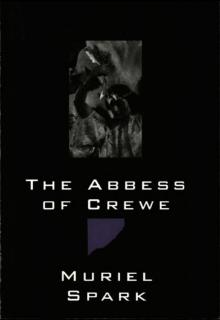 The Abbess of Crewe: A Modern Morality Tale
The Abbess of Crewe: A Modern Morality Tale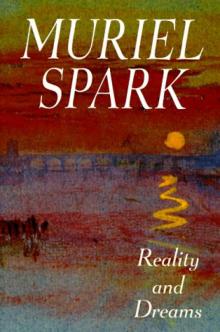 Reality and Dreams
Reality and Dreams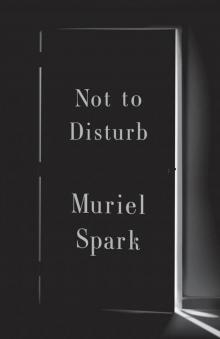 Not to Disturb
Not to Disturb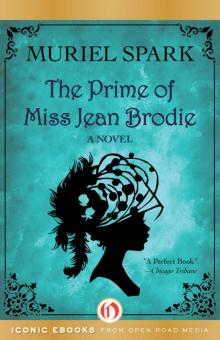 The Prime of Miss Jean Brodie
The Prime of Miss Jean Brodie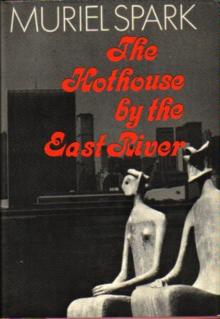 The Hothouse by the East River
The Hothouse by the East River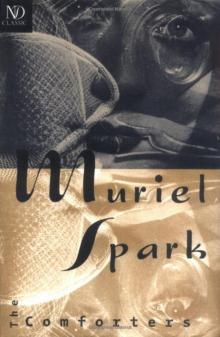 The Comforters
The Comforters (1958) Robinson
(1958) Robinson Unknown
Unknown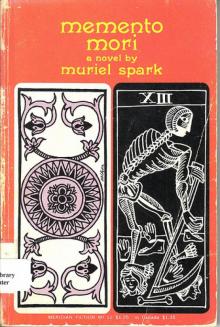 Memento Mori
Memento Mori The Finishing School
The Finishing School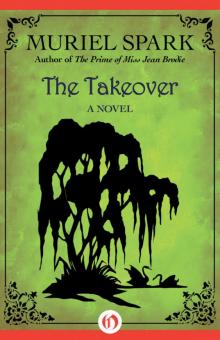 The Takeover
The Takeover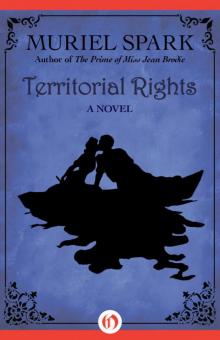 Territorial Rights
Territorial Rights The Complete Short Stories
The Complete Short Stories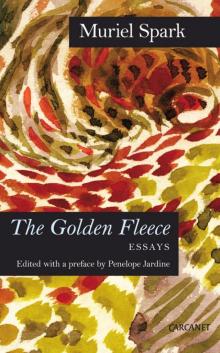 The Golden Fleece: Essays
The Golden Fleece: Essays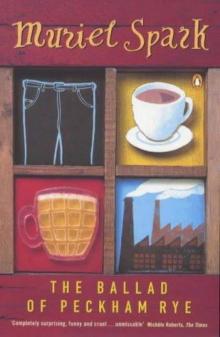 The Ballad of Peckham Rye
The Ballad of Peckham Rye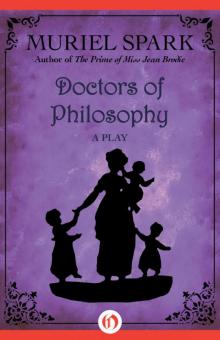 Doctors of Philosophy: A Play
Doctors of Philosophy: A Play The Mandelbaum Gate
The Mandelbaum Gate Loitering With Intent
Loitering With Intent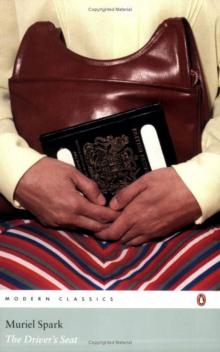 The Driver's Seat
The Driver's Seat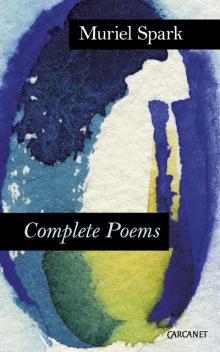 Complete Poems: Muriel Spark
Complete Poems: Muriel Spark Symposium
Symposium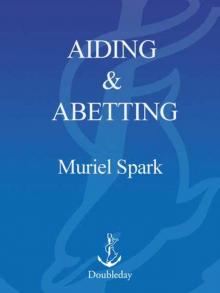 Aiding and Abetting
Aiding and Abetting The Golden Fleece
The Golden Fleece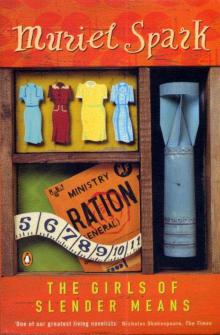 The Girls of Slender Means
The Girls of Slender Means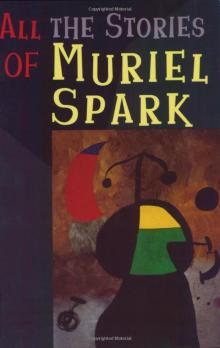 Alice Long’s Dachshunds
Alice Long’s Dachshunds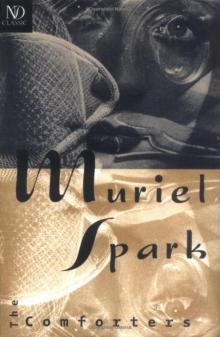 (1954) The Comforters
(1954) The Comforters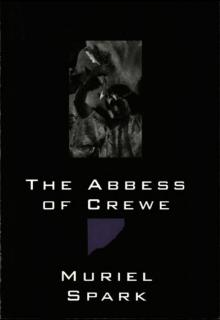 The Abbess of Crewe
The Abbess of Crewe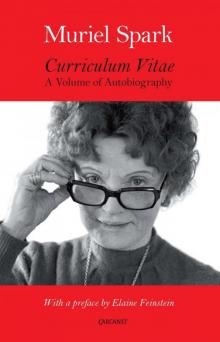 Curriculum Vitae
Curriculum Vitae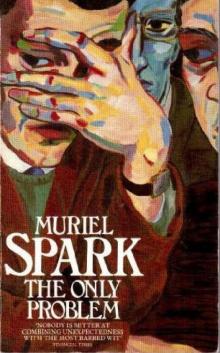 The Only Problem
The Only Problem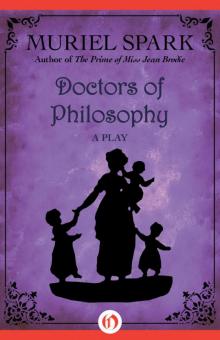 Doctors of Philosophy
Doctors of Philosophy